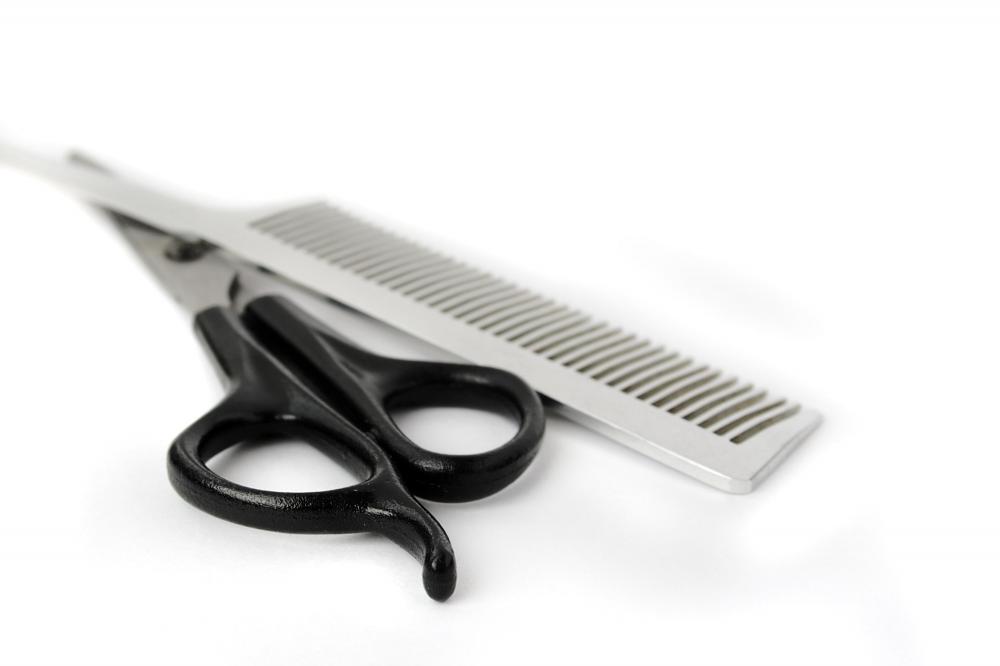At BeautyAnswered, we're committed to delivering accurate, trustworthy information. Our expert-authored content is rigorously fact-checked and sourced from credible authorities. Discover how we uphold the highest standards in providing you with reliable knowledge.
What Are the Pros and Cons of a Metal Comb?
Some of the most significant pros of metal combs include the tools’ durability and long life, as well as their ability to prevent snagging. Cons include a higher cost than alternatives, as well as a higher weight; metal tools tend to be significantly heavier, which can make them harder to carry in a pocket. In some people they can also cause allergic reactions, though this is rare. Beyond these basics, the pros and cons tend to be somewhat personal. Individual preferences and differences between specific hair types usually play into a person’s overall happiness with a comb, metal or not.
Durability and Lifespan

One of the most important pros is durability. Combs made of metal are usually more sturdy and are less prone to bending or breaking. What this means from a practical perspective is that they won’t grow warped with use and won’t lose teeth, even with excessive use. Some metal alloys are necessarily stronger than others and some combs may have slightly different thresholds as a result. In general, though, a metal comb is going to last far longer than a plastic or wooden alternative — and many are marketed to last for life.
Friction and Snagging

Another advantage of this sort of comb is that it flows through the hair easily and doesn’t usually cause snagging. The smoothness of the metallic surface means that there isn’t any friction between the hair and the teeth, which can lead to a smoother pull and less pain, particularly where snarls are concerned. The heavier weight of the teeth also allows resilient hair to be pushed through with relative ease. Snagging is much less likely to occur with a metallic tool, too, because the metal teeth are stronger than the strands of hair. Plastic combs are more likely to get caught in hair, and wooden combs can splinter and catch individual hairs.
Cost Considerations

It’s usually the case that metal-made combs are much more expensive than other options. This isn’t always a con, but can be in certain situations. The manufacturing process is more involved, and the materials are also more costly than most plastics and woods. Many retailers also market metallic combs as “specialty items,” which usually comes with a cost markup.
Weight and Size

Metal is, by its very nature, much heavier than most other substances. Perhaps unsurprisingly, then, metal combs are usually heavier than their counterparts. Their weight can sometimes make them more cumbersome to carry in a shirt or pants pocket, and they can cause imbalance in the breast pockets of light jackets. Metal styling tools are usually best kept in dedicated pouches or in a purse or briefcase.
Potential for Allergic Reaction
One potentially serious downside to using metal combs is that they can cause allergic reactions on the scalp. In most cases this is because of a specific metal allergy, which is generally thought to be quite rare. More common is an inflammation or irritation that might resemble an allergic reaction but is actually caused by broken skin on the scalp. Metal teeth can be rougher, and people who are too harsh with their pulls can scratch the surface of the scalp or otherwise aggravate the delicate skin there such that microbes and bacteria can penetrate. Itching, rashes and redness of the scalp are common side effects, but they’ll usually go away on their own once the metal contact is discontinued. Just the same, anyone with concerns or with pain that doesn’t seem to disappear should consult a medical professional.
AS FEATURED ON:
AS FEATURED ON:














Discuss this Article
Post your comments